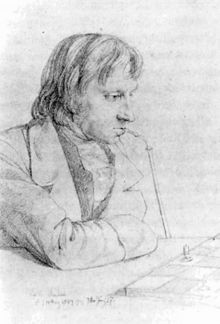Friedrich Matthias Jacobus Claudius

Friedrich Matthias Jacobus Claudius (born May 17, 1789 in Wandsbek ; † October 27, 1862 in Lübeck ) was a German lawyer , councilor and 1851/52 mayor of the Hanseatic city of Lübeck .
Life
Claudius was born the tenth of twelve children of the poet Matthias Claudius and his wife Rebekka Behn. He initially received private lessons from his father and then attended the Pforta State School at the age of 14 . He then studied law in Kiel and Heidelberg. In 1812 he passed the legal state examination before the Holstein Higher Court in Glückstadt and took up his first practical work in the Holstein administration as secretary of the Reinbek office . In 1814 he was admitted to the bar in Lübeck. In 1815 he was a participant in the war of liberationwith the Lübeck hunters. He then worked successfully as a lawyer until his election to the City Council of Lübeck on November 20, 1833. In the council, he mainly took on tasks as a judge at the Lübeck courts and in the administration of justice; but he was temporarily also in the finance department and in the commission for church affairs of the city. In the year of office of 1852 he was mayor . In addition, he was involved in the boards of directors of the Brigittenstift and the Westerauer Foundation as President.
He had been married to Johanna Wilhelmine Momma (born in Hamburg on December 10, 1791) since September 3, 1817, an older sister of Julie Momma, mother of the violinist, conductor and composer Alexander Ritter (1833-1896)
One of his sons was the Marburg anatomist Friedrich Matthias Claudius , the other became a forester in Behlendorf . His two unmarried daughters Rebecca (1819–1900) and Caroline (1830–1881) are a role model for the Gerhardt sisters in Thomas Mann's Buddenbrooks . His estate is in the archive of the Hanseatic City of Lübeck , some pieces on family history in the Hamburg State Archives . In 1857 he gave the Lübeck City Library the complete hand copy of the family-owned Wandsbeker Bote . Fehling as a biographer judged his work:
“During his office, Claudius was famous for his divine rudeness towards everyone. On the other hand, after his end he was acclaimed by the judiciary: “Straightforwardness and honesty of character, strict love of justice, conscientious fulfillment of his official duties, combined with amiable cosiness and a rich gift of healthy jokes.” In any case, he had few excellent friends, including Mayor Overbeck and Syndic Curtius belonged, and many opponents. "
Fonts
- Defense and supplication by the farmer Hans Jacob Hartz zu Dissau in investigative matters of the Dunkelstorf court against him on suspicion of participating in the murder of his son-in-law Joh. Hinr. Krahn jun. to dark peat. Borchers, Lübeck 1821.
literature
- Emil F. Fehling : On the Lübeckische Ratslinie 1814-1914 (= publications on the history of the Free and Hanseatic City of Lübeck. Vol. 4, Issue 1, ZDB -ID 520795-2 ). Max Schmidt, Lübeck 1915, No. 39.
- Emil F. Fehling: Lübeckische Ratslinie from the beginnings of the city to the present (= publications on the history of the Free and Hanseatic City of Lübeck. Vol. 7, Issue 1). Schmidt-Römhild, Lübeck 1925, No. 983.
- Mention in the article: Roedl, Urban: Claudius, Matthias. In: New German Biography (NDB). Volume 3, Duncker & Humblot, Berlin 1957, ISBN 3-428-00184-2 , p. 266 ( digitized version ).
Individual evidence
- ↑ Ada Kadelbach : "She took an ancient book out of her pouch ..." Paul Gerhardt with Matthias Claudius and Thomas Mann. In: Günter Balders , Christian Bunners (ed.): “And what he sang has not yet faded away”. Paul Gerhardt in the mirror of literature (= contributions of the Paul Gerhardt Society. Vol. 7). Frank & Timme, Berlin 2011, ISBN 978-3-86596-360-4 , pp. 27–43, here p. 41.
- ^ Finding aid for the Claudius Collection (PDF; 20 kB)
| personal data | |
|---|---|
| SURNAME | Claudius, Friedrich Matthias Jacobus |
| ALTERNATIVE NAMES | Claudius, Friedrich |
| BRIEF DESCRIPTION | German lawyer and councilor |
| DATE OF BIRTH | May 17, 1789 |
| PLACE OF BIRTH | Wandsbek |
| DATE OF DEATH | October 27, 1862 |
| Place of death | Lübeck |
